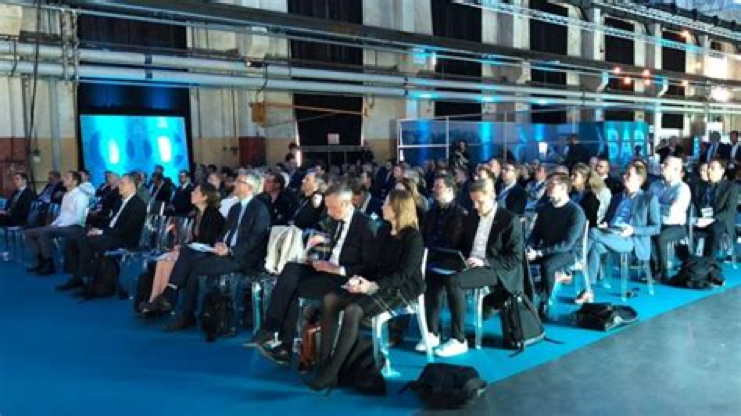The Decarbonisation Think Tank at NorShipping 2019 - Notes from the Chair
It was an honour to be invited to Chair the Decarbonisation Think Tank at NorShipping earlier in the summer. Of course, this didn’t leave me much opportunity to take notes so this is a round up, a few weeks on, of my reflections and takeaways from the event.
Overall NorShipping in 2019 felt like a very different event to the 2017 edition. Almost every exhibitor referenced the environmental benefits of their product of service. My favourite strap line was: “Does no environmental harm.” A masterclass in weaving an environmental message into your marketing.
In Hall B huge versions of the logos of all 17 Sustainable Development Goals (SDGs) decorated the entire wall. In 2017 one exhibitor had to be stopped from encouraging his stand visitors to paint women. That is actually paint the bodies of real live women. Which felt a bit last century to be frank.
So, 2019 was different. Very, reassuring, different.
The world of shipping has woken up to the planet size challenges and the consequential stellar opportunities up for grabs from addressing our collective climate emergency.
I was also struck by how collaborative the participants in our Think Tank were. Senior executives from across the spectrum from green NGOs to representatives of industry bodies heavily dependent on fossil fuels sought common ground, really seemed to want to find ways of progressing. In the past I’ve felt that these kinds of events were overly-well rehearsed slanging matches. Same old shouty message, followed same return argument.
Indeed, it was perhaps the most unlikely Thinker who suggested we widen the discussion to look beyond carbon emissions, that we consider how to eliminate all Greenhouse Gas emissions.
And then the lights went out.
Exceptionally hot weather in Norway had triggered severe electrical storms that knocked out the Conference Centre’s power supply. The metaphor was not lost on anybody as we sat in silent darkness for many long minutes.
Once we were powered up again, we kicked off with an explanation of the International Maritime Organization’s process and progress. The challenges of reaching consensus across such a wide international group were recognised and IMO’s pluralism was applauded.
The Thinkers agreed that we would explore what industry could do to support IMO and policy ambition by demonstrating it wasn’t a penalty to go green. That it could be the exact opposite.
We started by thinking about technology. These are my notes:
· This is shipping’s MOONSHOT – working across the industry we can solve the big challenges
· By 2050 every ship has reduced GHG intensity by 70-85% or is ZERO EMISSION
· COMPLEXITY of changing systems, of systems within systems is very hard
· CUSTOMERS (cargo owners) can and will go elsewhere for freight services that are cleaner/cheaper – shipping has to face-up to this reality
· There is NO ONE TECHNOLOGY SOLUTION – multiplicity of technologies for a heterogenous growing fleet, how do we match solutions to problems – what does that matrix look like? Who will drive it?
· INNOVATION must be encouraged
· COLLABORATION is in everyone’s interest
· INTEGRATION of multiple solutions
· START SMALL, find the right places to do so, learn by doing
· IT’S HAPPENING!
ENABLERS –
· Port of Oslo as EG – public procurement policies for zero emission solutions …scale out from the small start
· Additional cost for green [a popular meme – that needs more challenge than I was able to make in the TT]
· Parachute new tech into existing systems – retrofit to improve fuel/emission savings
· Split incentive narrative – is it real? Ship owners do buy their own fuel and do want to reduce emission
· LISTEN to each other more – we are all doing our best within the constraints we have to live within
· How do we scale up? Develop new business models and start in specific segments – short sea …start with low hanging fruit and scale up from there
· How do we engage with the public/consumers better – would they pay more if there were better awareness of carbon cost of freight of consumer goods – a study says 90% would pay more (in reality though?)
· Cargo owners aren’t waiting – getting on with it
· Better collaboration between innovators and established players – it’s more than just tech…does your tech work in my business
· Route management medium level hanging fruit – digital opportunities for improving efficiency
· EC innovation fund to support energy transition with 60% funding for tech and fitting costs
· Finance becoming more focused on not funding climate risky projects
· Fuel tax – hypothecated to support innobvation
· Shipping still least carbon intensive – modal shift could create new business opportunities in shipping
COMMITMENTS
· Listen more – be more courageous in speaking out
· Develop more clusters for collaboration
· Develop green ships globally
· Convince politicians to incentivise maritime opportunities
· Commit to innovation, sustainability – educate – nurture innovation
· Commit to work with IMO to achieve good outcome, keep an open mind, look at al parts of the solution
· Be utterly transparent about work. Produce biochar as a carbon offset
· “Can’t drive green ships on red numbers” – commercial solutions to reduce emissions, invoke push/pull include market and politicians
· Commit to driving change through industry
· Maximise transparency
· Drive ambitious GHG policy politically, focus on euro fleet to start small; support innovation and collaborate especially on wind and hydrogen
· Maximise communications around positive clusters and business case


